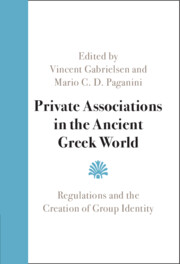Book contents
- Private Associations in the Ancient Greek World
- Private Associations in the Ancient Greek World
- Copyright page
- Contents
- Tables
- Contributors
- Preface
- Abbreviations
- Chapter 1 Associations’ Regulations from the Ancient Greek World and Beyond
- Chapter 2 Admission Procedures and Financial Contributions in Private Associations
- Chapter 3 Regulations on Absence and Obligatory Participation in Ancient Associations
- Chapter 4 The Place of Purity
- Chapter 5 Associations and Place
- Chapter 6 Greek thorybos, Roman eustatheia
- Chapter 7 Private Affairs in a Public Domain
- Chapter 8 A World Full of Associations
- Chapter 9 Ordo corporatorum
- Chapter 10 Rules and Regulations of Associations
- Chapter 11 Conclusion
- Bibliography
- Subject Index
- Index Locorum
Chapter 6 - Greek thorybos, Roman eustatheia
The Normative Universe of Athenian Cult Associations*
- Private Associations in the Ancient Greek World
- Private Associations in the Ancient Greek World
- Copyright page
- Contents
- Tables
- Contributors
- Preface
- Abbreviations
- Chapter 1 Associations’ Regulations from the Ancient Greek World and Beyond
- Chapter 2 Admission Procedures and Financial Contributions in Private Associations
- Chapter 3 Regulations on Absence and Obligatory Participation in Ancient Associations
- Chapter 4 The Place of Purity
- Chapter 5 Associations and Place
- Chapter 6 Greek thorybos, Roman eustatheia
- Chapter 7 Private Affairs in a Public Domain
- Chapter 8 A World Full of Associations
- Chapter 9 Ordo corporatorum
- Chapter 10 Rules and Regulations of Associations
- Chapter 11 Conclusion
- Bibliography
- Subject Index
- Index Locorum
Summary
Obviously, this is not the place to argue about the impact of the description on Demosthenes’ rhetorical strategy.2 The passage is significant in another, rather neglected, respect. It reflects the ambience created by these kaloi thiasoi, ‘brilliant groups’, an atmosphere of hustle and buzzes. It is exactly this sense of thorybos conveyed by the passage that interests me. Similar thorybos may be behind the decision of the deme of Piraeus to ban groups of worshippers convening outside the Thesmophorion in Piraeus, except on certain festival days.3 Thorybos (that is, cheers, shouts, heckling and laughter) was an essential feature of social activity in the ancient Greek world. Quite apart the religious sphere, several scholars emphasised the role of thorybos in the working of Athenian democracy, in the assembly and in the lawcourts.4 Judith Tacon claims that thorybos (that is, cases when speakers interrupt each other, demos interrupts speakers, demos allies with opposing speakers) was an integral feature of assembly debate and by extension of Athenian democracy. Anti-democracy theorists regarded it as negative.
- Type
- Chapter
- Information
- Private Associations in the Ancient Greek World , pp. 144 - 162Publisher: Cambridge University PressPrint publication year: 2021



